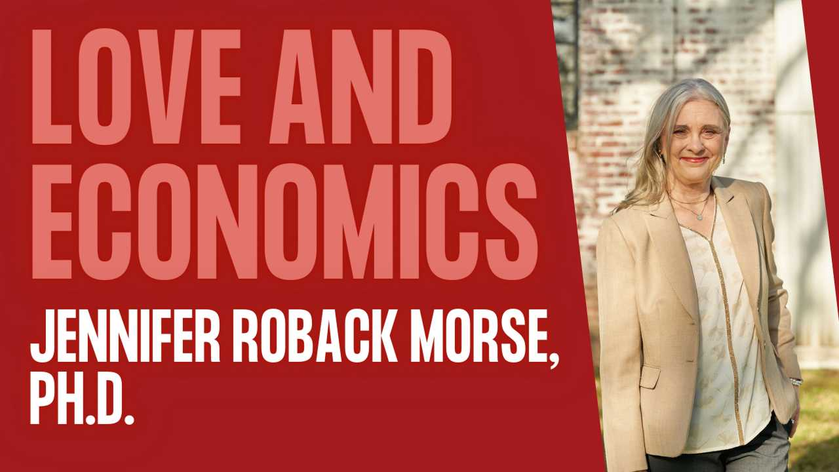In the last chapter, we asked, what is love? To will the good of another appears to be largely an intellectual task, a job of the mind. In that case, we might wonder why love seems so elusive.
If having the right thoughts assures us of love and being loved, and if love is such a great good, why isn’t everyone just swimming in love? In this chapter, I offer an economist’s approach to an answer. Love is scarce because it is, in some way, costly.
Let us first imagine ourselves as the giver of love. We might, somewhat irreverently call the giver of love the sup- plier of love. Let us ask the following questions: Is it true that we are willing to supply more love when we receive a greater reward for doing so? Put it another way:Are we less willing to give love when it is costly to us to do so? To answer these questions, we must reflect on the costs of giving love.
Looking at the three components of love that we outlined in the previous chapter, we can analyze what it means to say “more love.” More love could mean a more clear perception of the person as he really is. Another dimension would be a deeper acceptance of the person as he really is, while yet another component would be the more earnest desire that the person change for the better.
It seems that all these elements must increase simultane- ously, for if our desire for positive change increases without an accurate vision of the person, then we may become worse than a nuisance, a back-seat driver without a road map. If our desire for positive change increases without an increase in our solidarity with the person, then we become a shal- low busybody,a coach on the sidelines shouting instructions, without any real commitment to the person or willingness to engage in the game. If our acceptance of the person in- creases, but not our desire for positive change, then we could become accomplices in our friend’s self-deception rather than being a constructive force in his life. If our acceptance of the person increases without a willingness to remain in solidarity with the person,then we are more indifferent than genuinely friendly or loving. If our perception becomes more accurate, but our desire for change for the better does not increase, then we may become callous to the good itself. Finally, if our perception becomes more accurate, but our willingness to remain in solidarity with him does not, then we might turn our backs on our friend, giving him up for lost or declaring him to be no longer worth the effort. So when we say that our love increases, we must mean that all of these aspects increase in some simultaneous way.
We sometimes hear the expression “Love the sinner, but hate the sin.” This admonition calls upon us to love an- other person in all three of these dimensions. We have to see the other person clearly enough to realize he is about to do something wrong or destructive. The adage enjoins us to maintain a loving disposition while still hoping that he improves his behavior. In my observation, this is actually very difficult.
Often we invoke this adage when we are about to overlook the person’s behavior because we do not want the cost of a messy confrontation with him. We redefine the person’s actions so as to avoid seeing the sin. The alternative position is just as difficult. If we really let ourselves see how bad a person’s behavior is, we feel revulsion rather than love. It is easier to walk away from the person, perhaps with a self- righteous air. Facing the truth about a person’s behavior and still maintaining a loving disposition toward him can be intolerably painful.
There are few things more difficult than watching a loved one engage in behavior that is destructive to himself or others. These situations tax our love as much as anything can. Even this brief examination is enough to suggest that love is costly.
As we examine each of these three components of love in more detail, we will see that increasing love in any of these dimensions is costly. This means that not everyone will be observed in possession of love or, perhaps more accurately, of a loving disposition.
Costs of Perception
The most basic cost of clearly seeing the other person is time. We have to spend time with the person, in effect gathering data so that we know the person. We have to spend time in reflection so we know the meaning of what we observed.
The cost of accurately perceiving another person also includes the cost of letting go of a false image of the person. We have an image of another person perhaps because that image in some way reflects upon ourselves. We would like to live in the truth about the other person, but we are afraid. Sometimes, we cannot imagine living without the lie. But we can have a kind of moment of truth, in which we breathe a sigh of relief as we finally face an unpleasant reality that we had been avoiding. We are willing to face reality, but since it costs us something to do it, we do not always do it immediately. It is possible for us to spend quite a bit of time in some degree of self-deception. Facing reality is a good, but it is a costly good.
The cost of this type of knowledge necessarily means that love will indeed be scarce. The devotion needed to develop this type of knowledge is necessarily time intensive. For the finite-lived person, love is scarce.
The cost of accurately perceiving another person implies that there is a difference in kind between intimate love and love among strangers, as described in the previous chapter. It is intelligible to say “I love Mother Teresa” or “I love Madonna.” It is possible to sincerely wish them well. It is even possible and intelligible to say,“I love the poor.” I can sincerely will that the individual members of this large, im- personal class of people have good things happen to them. But I cannot invest in knowing them to the same extent that I can invest in knowing my own mother. I cannot possibly know them as well or as clearly.
These limitations on our knowledge are deep and radical and cannot be willed away. No matter how much we will good for a stranger, we cannot know what is good for him. We cannot see him clearly enough to be of genuine service to him, except in the most general way. We cannot even pray our way out of this radical ignorance. We can be aware as we pray for a stranger that we do not know what he really needs: we do not know exactly what to pray for on his behalf. All we can reasonably do is to entrust him to the care of God, who knows better than we do what he actually needs.
Costs of Solidarity
What of standing in solidarity with the person, in spite of his ffaws and struggles? If you could do this at no cost, would you? People do, in effect, stand in solidarity with others at minimal cost through prayer. Praying for another person is a low cost way of aligning ourselves with him, especially in his suffering. We know that it is of some comfort to our friend, even a nonbelieving friend, to know that we are praying for him. And the person engaged in prayer receives the benefit of a sense of unity with another person.
Apart from this, however, we must admit that aligning ourselves with a suffering or struggling friend is in general costly. This is one way that we recognize a friend, that he is willing to bear costs on our behalf. Sometimes, we feel helpless as we watch a friend struggle or suffer. That sense of helplessness pains us so much that we run from it.
We actually find it easier to stand by our friends when some specific task is required of us. Physical illness or bodily tragedies are often easier to manage than psychological dis- tress or the inner anguish of emptiness. For our sick friends, we bring chicken soup, we pick up their kids from school, we visit them in the hospital. But we can be overwhelmed just from listening to a person in despair. We cannot think of anything to do, and we cannot stand his suffering, so we run from him.
The economist can easily see that bringing chicken soup involves costs of time and money. We could rather easily add up the costs of the soup, the transportation, the implicit value of time, and so forth. The costs of standing in solidarity with a friend in mental anguish, on the other hand, must be inferred indirectly. One way of making that inference is to realize that people usually prefer to bear the chicken soup costs rather than the psychic costs of dealing with a person in emotional distress. From this observation, we can infer that those psychic costs must be at least as great as the costs of delivering chicken soup. It is easier to run errands for a friend than to sit quietly with him. In fact, we are willing to do quite a lot of running in order to avoid the quiet sitting. This tells us just how very costly we find the quiet sitting. So we conclude that standing in solidarity with a friend while he strives for positive change is a costly activity.
Of course, standing in solidarity with a person requires that we have some idea why we are with her. In other words, we must have some idea what the good for another person truly involves. This leads us to the third component of in- creasing our love for another person: increasing our desire for positive change.
Costs of increasing our Desire for Positive Change
This set of costs is the most interesting and complicated. Often our desire for positive change is not exactly loving toward the other person. All too often, we want the other person to change for our own comfort and convenience. We want him to change things which are legitimate objects of personal preference, all the while pretending that they are objects of dire moral consequence.
We manage to fight over how to put the toothpaste cap on the tube, or how much spice to put in the food, or how to organize the socks in the drawer. Our families are not deceived by our claims to superior insight into the “one true way” to manage these household affairs. They recog- nize our desire for our own comfort, our desire to control everything and everybody in our environment no matter how we masquerade it as being in their interests to do it all our way. We spend a lot of time fussing, and self-righteous fussing at that.
We imagine that our family members’ love for us ought to include an unlimited willingness to accommodate us. We can easily transform an innocent act that happens to ir- ritate us into an act of unmitigated, premeditated evil. We can get ourselves twisted into a position of expecting total adaptation by the other person to our whims, all the while demanding complete tolerance of any failings of our own. We tell ourselves this is love.
One of the costs of love is separating our concern for the genuine well being of the other person from our own comfort. This is a non-trivial cost. For our own comfort is usually our most immediate consideration and escaping discomfort usually our priority. It takes much effort to resist the urge to react to our impulses.
As difficult as this is, refraining from such fussing is only the first and most basic cost of increasing our desire for positive change. Allowing the person some latitude, acting toward him with some magnanimity of spirit, simply allows two people to be in the same room. It does not by itself create love between them.
The next step is to become truly aware of what the good for the other person is. It is something more than correcting a myriad of irritating habits. We have to have sufficient awareness of the good ourselves to be able intelligently to wish for it for other people. We must act upon the good for ourselves, even when doing so is costly to us. We could, for instance, yell at someone to pick up his socks, but we are not very credible if we are surrounded by our own mess. We could try to convince him that he needs, for his own good, to spend more time with the children. But this plea is likely to be viewed with suspicion if we are working sixty-hour weeks ourselves.
In this way, we can finally be brought to a genuine act of love. For if we are willing to bear some costs in order to achieve the good ourselves, we might actually persuade another person that our desire for positive change is genuine. If we do not desire the good enough to bear some costs ourselves, the other person has reason to be suspicious of us and our motives.
The less we trumpet our sacrifices, the more credible we are. People run like mad from a the self-created martyr, and with good reason. We cannot teach or lead another person to goodness without setting the example ourselves. We cannot lead credibly if we are at all times reminding the other person how much we are suffering on his or her behalf. The target of our suffering might well conclude that we are trying to induce an ever greater debt of guilt.
But quietly going about our business demonstrates that we regard this particular cost as worth bearing. The suffer- ing is not really suffering at all if we are engaged in doing something good that is worth doing. The discomfort we feel arises from the fact that we had to suppress our inclinations and inconvenience ourselves. As a side benefit, the other person is more likely to be persuaded to change his behavior as a result of demonstration rather than pontification.
In this way, we can see a kind of “gains from trade” in the logic of love, as well as in the ordinary world of market exchange. Our initial motivation may have been our own discomfort with our friend’s actions,words,beliefs,or priori- ties. Our effort to relieve our own uneasiness focuses initially on the other person; we come to realize that something is amiss in his approach. But if we continue to be focused on him and his problems, we may miss the opportunity not only to reach him but to grow ourselves. Instead of yelling at him about his dirty laundry, we pick up after ourselves, cheerfully. Instead of pleading with him to spend more time with the children,we start refusing business trips and extra work hours and spend more time with the kids ourselves.
If we pay the price ourselves,both for the good it produces for ourselves and as an act of love for the other person, then we have created a constructive cycle in which no one loses. “Gains from trade” is at the heart of the logic of love. But the gains do not arise from a carefully orchestrated exchange of goods or promises ensuring that neither party is exploited. The gains arise because one person takes the risk of making a generous first move. The first mover necessarily benefits, regardless of the reaction of the other person because the first move was a move toward the good. Neither indifference nor hostility on the part of the other person can ultimately erase the good that the first mover attained for himself. If no genuine good truly flows to the first mover, then perhaps he was just fussing after all.
To read the full book, order it from our store: https://ruthinstitute.org/product/love-and-economics-it-takes-a-family-to-raise-a-village/




















